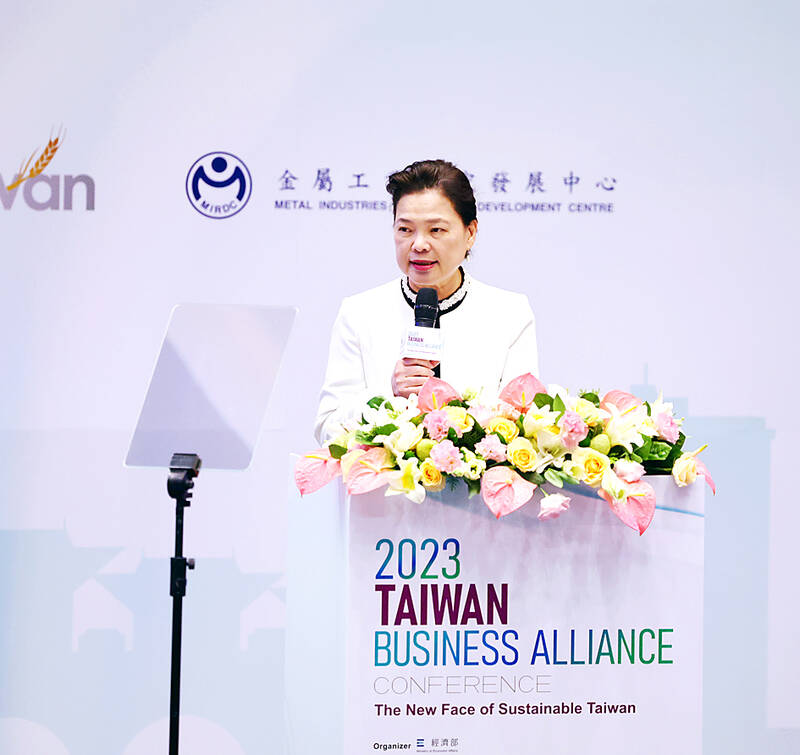The government’s three major “Invest in Taiwan” programs are expected to attract NT$230 billion (US$7.33 billion) in investment this year, creating an estimated 19,000 jobs, the Ministry of Economic Affairs said on Monday.
As a result, the three programs — the Action Plan for Welcoming Overseas Taiwanese Businesses to Return to Invest in Taiwan, the Action Plan for Accelerated Investment by Domestic Corporations, and the Action Plan for Accelerated Investment by Small and Medium-sized Enterprises — are expected to reach an aggregate investment of NT$2.4 trillion as of the end of this year since their launch in 2019, Minister of Economic Affairs Wang Mei-hua (王美花) said.
Regarding foreign investment in Taiwan, Wang said Dutch semiconductor equipment maker ASML Holding NV is building its new factory in New Taipei City’s Linkou District (林口) starting this year, and Japanese electronics and semiconductor company Tokyo Electron Ltd is completing its operations center in the Southern Taiwan Science Park (南部科學園區) in Tainan by the end of this year.

Photo: CNA
Japanese semiconductor material provider Fujifilm Holdings Corp plans to construct a new facility in Hsinchu and expand existing production lines in Tainan, Wang said.
Other than semiconductor-related foreign investment, Wang said that the expansion of the offshore nacelle assembly facility of Siemens Gamesa Renewable Energy SA in Taichung — the first outside Germany — was completed in December last year, with operations slated to start in the second quarter of this year.
The minister said the edge that Taiwan’s semiconductor industry has in advanced manufacturing and the leading foreign corporations’ investment in the nation have driven growth in the IC design, packaging and testing supply chain, making Taiwan more indispensable.
The government has also tabled policy measures — Article 10-2 of the Statute for Industrial Innovation (產業創新條例) that grants tax credits and the Taiwan Chip-based Industrial Innovation Program starting this year — to help the companies tap into the advanced manufacturing, research and development, and the application of artificial intelligence chips, Wang said.
Together with TSMC’s advanced manufacturing technology, the addition of leading international materials and equipment companies such as ASML, Tokyo Electron, Applied Materials Inc and Lam Research Corp would provide local manufacturers and suppliers a good opportunity to join the supply chain, “making it harder for Taiwan to be replaced,” she said.
Asked about US officials’ visiting Taiwanese semiconductor suppliers next month to discuss new export controls, Wang said the visit is similar to one in October last year, aiming to help Taiwanese suppliers better understand the content of US export controls on China, with the regulations totaling about 400 pages.

TAKING STOCK: A Taiwanese cookware firm in Vietnam urged customers to assess inventory or place orders early so shipments can reach the US while tariffs are paused Taiwanese businesses in Vietnam are exploring alternatives after the White House imposed a 46 percent import duty on Vietnamese goods, following US President Donald Trump’s announcement of “reciprocal” tariffs on the US’ trading partners. Lo Shih-liang (羅世良), chairman of Brico Industry Co (裕茂工業), a Taiwanese company that manufactures cast iron cookware and stove components in Vietnam, said that more than 40 percent of his business was tied to the US market, describing the constant US policy shifts as an emotional roller coaster. “I work during the day and stay up all night watching the news. I’ve been following US news until 3am

UNCERTAINTY: Innolux activated a stringent supply chain management mechanism, as it did during the COVID-19 pandemic, to ensure optimal inventory levels for customers Flat-panel display makers AUO Corp (友達) and Innolux Corp (群創) yesterday said that about 12 to 20 percent of their display business is at risk of potential US tariffs and that they would relocate production or shipment destinations to mitigate the levies’ effects. US tariffs would have a direct impact of US$200 million on AUO’s revenue, company chairman Paul Peng (彭雙浪) told reporters on the sidelines of the Touch Taiwan trade show in Taipei yesterday. That would make up about 12 percent of the company’s overall revenue. To cope with the tariff uncertainty, AUO plans to allocate its production to manufacturing facilities in

Six years ago, LVMH’s billionaire CEO Bernard Arnault and US President Donald Trump cut the blue ribbon on a factory in rural Texas that would make designer handbags for Louis Vuitton, one of the world’s best-known luxury brands. However, since the high-profile opening, the factory has faced a host of problems limiting production, 11 former Louis Vuitton employees said. The site has consistently ranked among the worst-performing for Louis Vuitton globally, “significantly” underperforming other facilities, said three former Louis Vuitton workers and a senior industry source, who cited internal rankings shared with staff. The plant’s problems — which have not

COLLABORATION: Given Taiwan’s key position in global supply chains, the US firm is discussing strategies with local partners and clients to deal with global uncertainties Advanced Micro Devices Inc (AMD) yesterday said it is meeting with local ecosystem partners, including Taiwan Semiconductor Manufacturing Co (TSMC, 台積電), to discuss strategies, including long-term manufacturing, to navigate uncertainties such as US tariffs, as Taiwan occupies an important position in global supply chains. AMD chief executive officer Lisa Su (蘇姿丰) told reporters that Taiwan is an important part of the chip designer’s ecosystem and she is discussing with partners and customers in Taiwan to forge strong collaborations on different areas during this critical period. AMD has just become the first artificial-intelligence (AI) server chip customer of TSMC to utilize its advanced